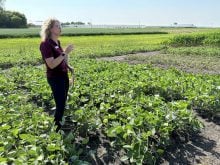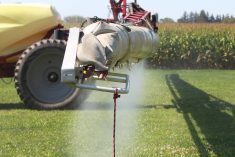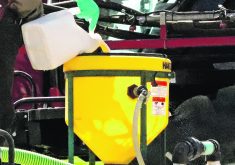A long-term study of pesticide applicators in the United States has found that glyphosate exposure is not associated with cancer.
The Agricultural Health Study, published in the Journal of the National Cancer Institute, looked at the cancer incidence in 54,251 farmers and ag workers in Iowa and North Carolina.
Of that group, 44,932 had used glyphosate, the active ingredient in Roundup and the most popular week killer in the world.
Read Also

VIDEO: Agritechnica Day 4: Robots and more robots, Nexat loves Canada and the trouble with tariffs
Agritechnica Day 4: Robots and more robots, Nexat loves Canada and the trouble with tariffs.
“Glyphosate was not statistically significantly associated with cancer at any site,” the scientists behind the study said in the abstract of the journal article.
However, the abstract also said there were marginally higher rates of one type of cancer.
“Among applicators in the highest exposure quartile, there was an increased risk of acute myeloid leukemia (AML) compared with never users … though this association was not statistically significant.”
The Agricultural Health Study is a collaborative effort between scientists at the U.S National Cancer Institute, the National Institute of Environmental Health Sciences, the Environmental Protection Agency and the National Institute for Occupational Safety and Health.
It began in 1993 and is a study with approximately 90,000 participants. Mostly farmers and their spouses in Iowa and North Carolina, along with commercial pesticide applicators in Iowa. The purpose is to evaluate agricultural exposures that may be connected to cancer and other health outcomes.
The scientists in the AHS have observed associations with specific pesticides and certain cancers. For instance diazinon has been associated with lung cancer and leukemia.
The AHS is highly regarded in the scientific community, as one the best long term studies on the health impacts of pesticides.
A representative of Monsanto, which manufactures Roundup, said the Agricultural Health Study is powerful evidence that glyphosate is safe.
“This is the largest study of agricultural workers in history, over the longest period of time,” Scott Partridge, Monsanto vice-president of strategy, told Reuters. “It definitively demonstrates in a real-world environment that glyphosate doesn’t cause cancer.”
The herbicide’s link to cancer has been debated since March 2015, when the International Agency for Research on Cancer (IARC), a unit of the World Health Organization, classified the herbicide as probably carcinogenic to humans.
Many toxicologists condemned the IARC finding as invalid and biased, claiming IARC scientists ignored science demonstrating that glyphosate is safe. Regulatory bodies around the globe, including Health Canada and the European Food Safety Authority, have studied the herbicide and concluded it’s not a cancer risk.
Despite the body of evidence supporting its safety, European politicians are locked in a vicious fight over the herbicide.
The European Commission has proposed to renew glyphosate’s license for five years, but today representatives of EU member states rejected the proposal or abstained from the vote.
The EU will continue to seek an alternate solution before Dec. 15, when regulatory approval for glyphosate expires in Europe.
Contact robert.arnason@producer.com
















